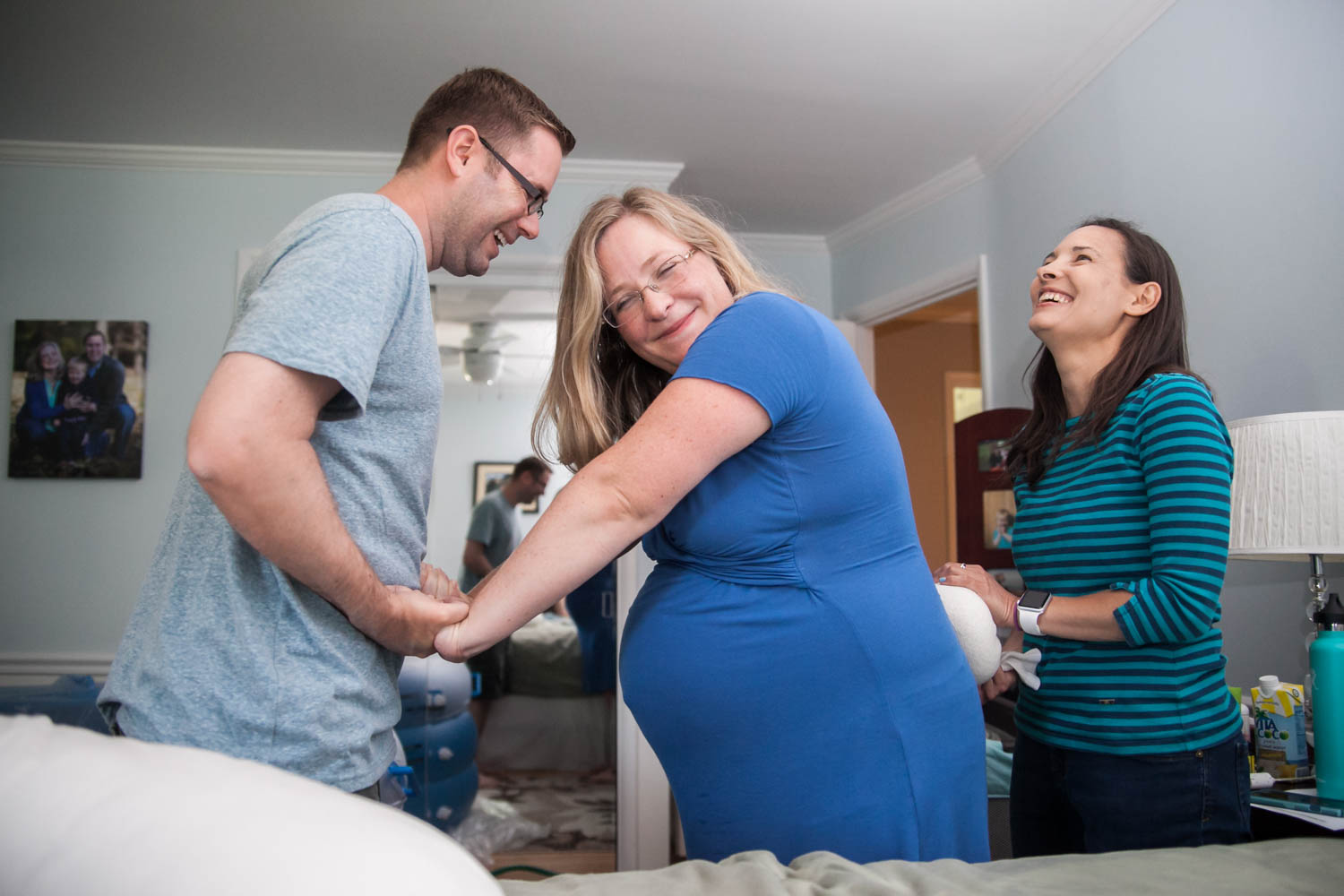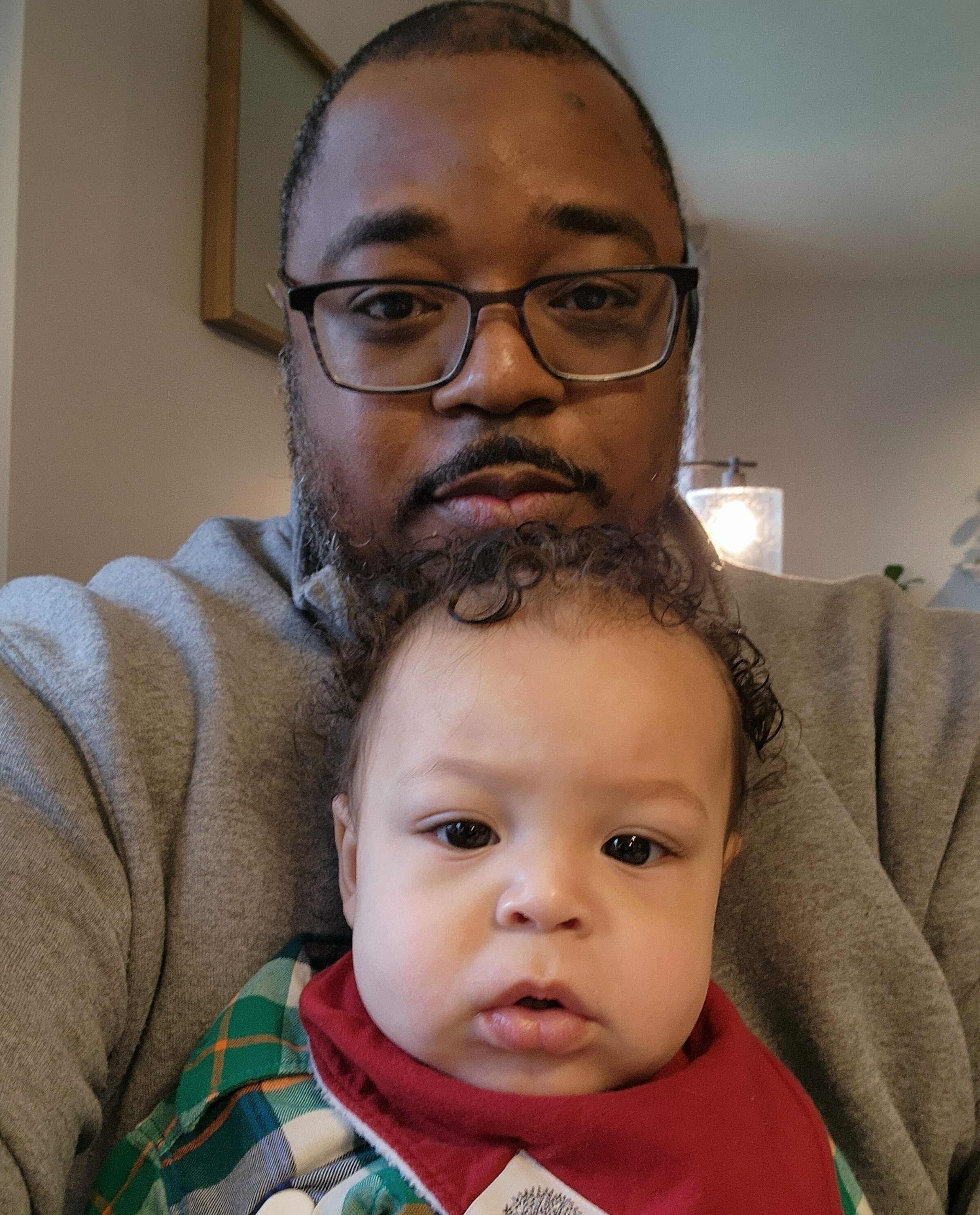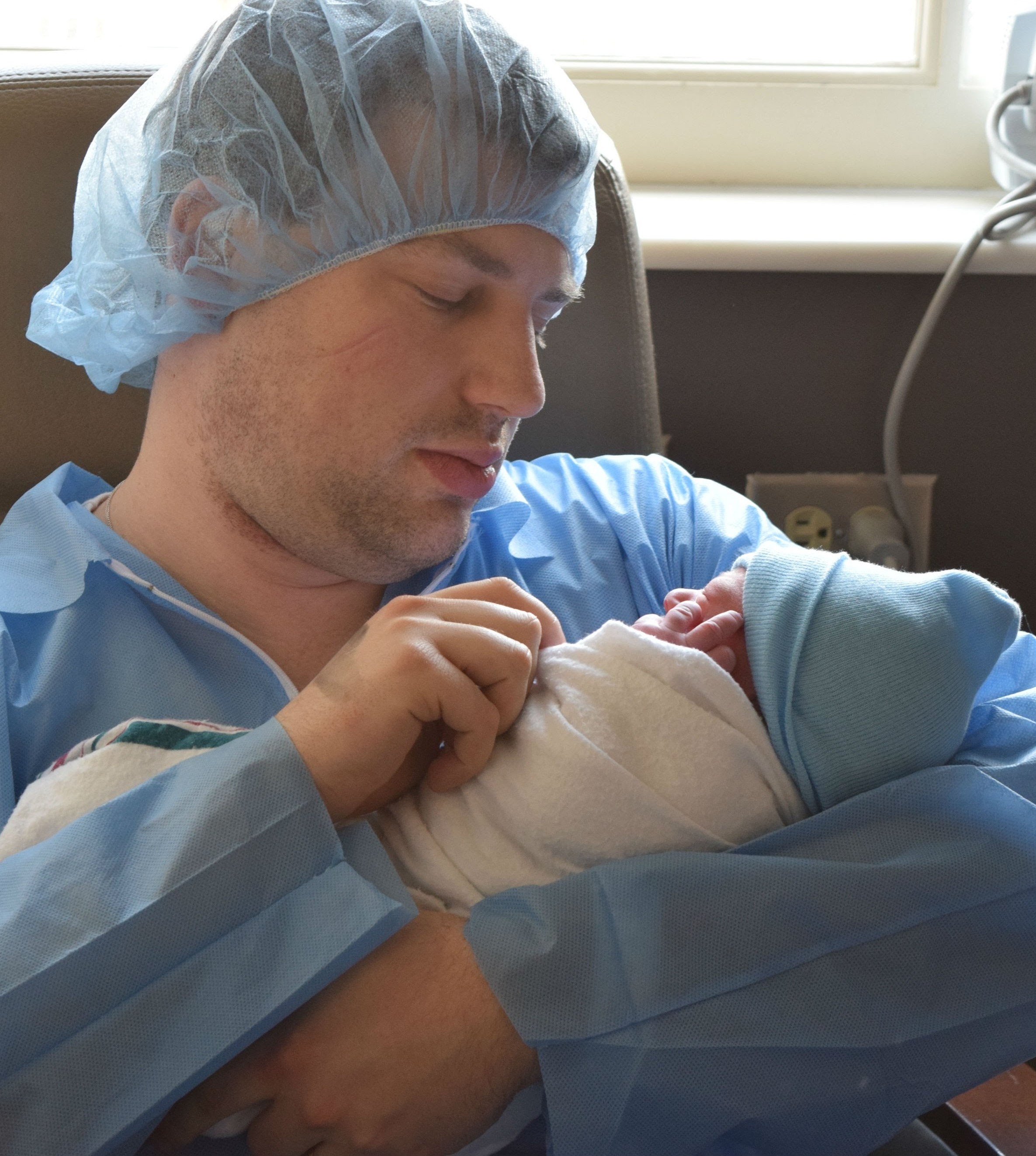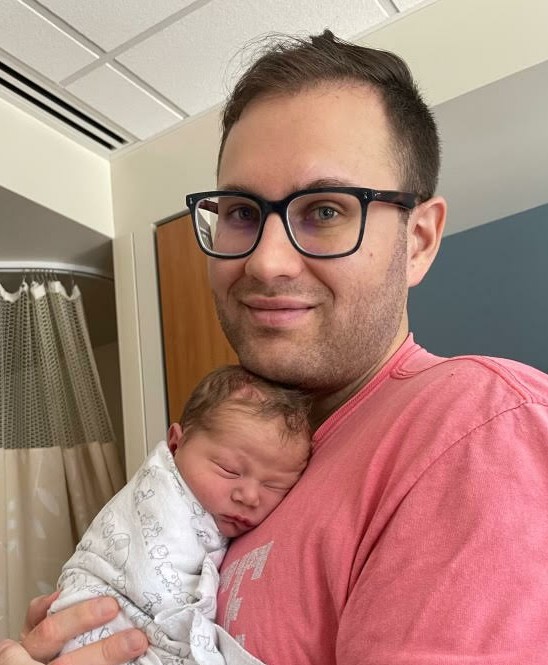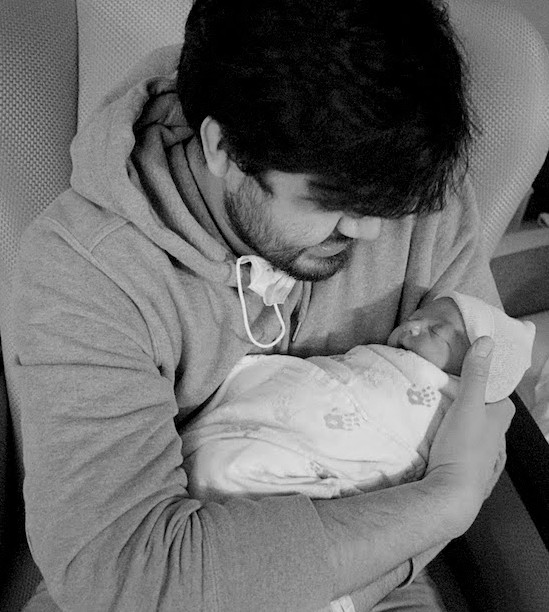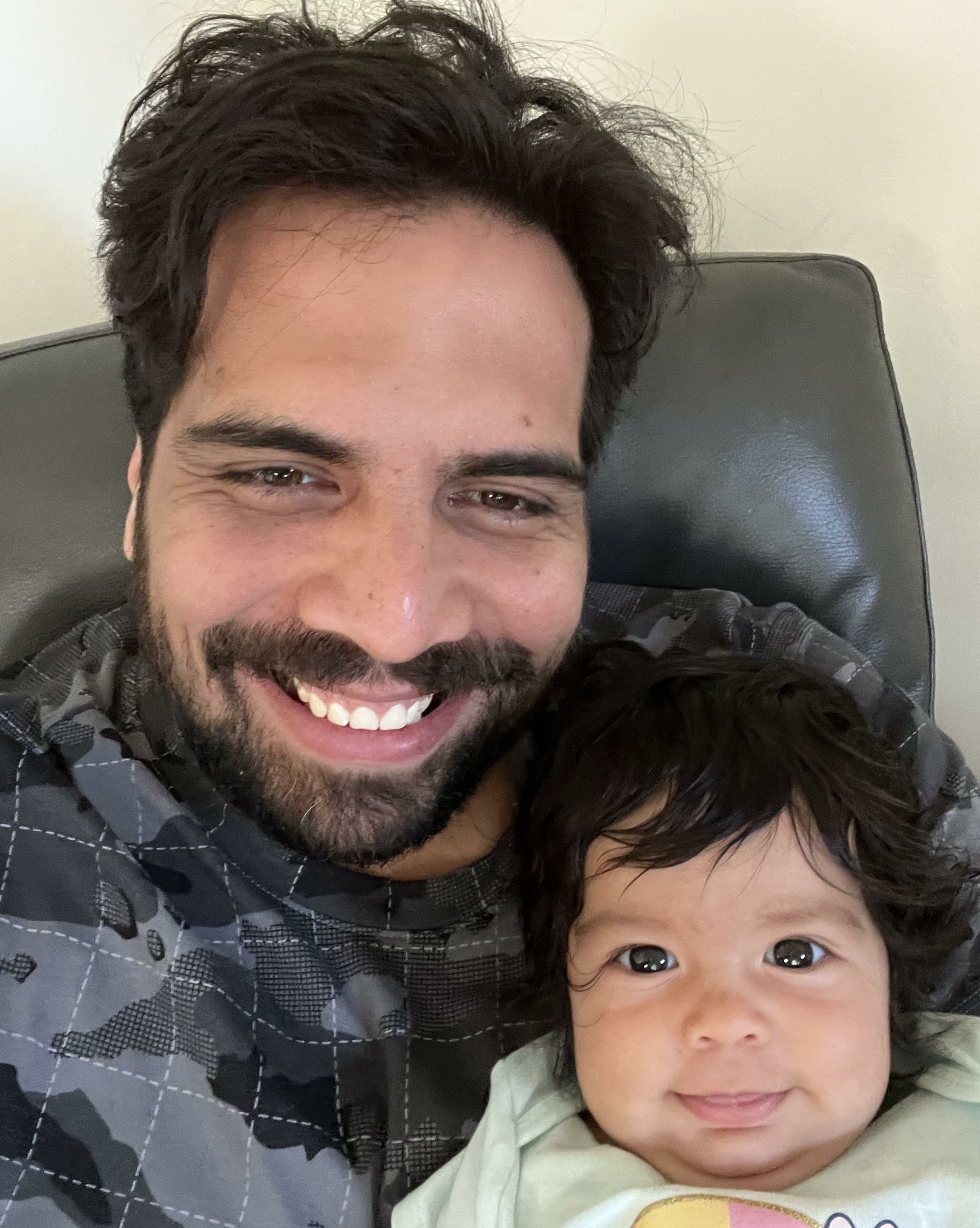Transcript
Anne Nicholson Weber (00:00):
Welcome. This is episode four. I’m so glad you’re here. Today my guests are five fathers who are going to share their personal experiences with doula care. Stick around to hear how they each made the decision to hire a birth doula, what doula care looks like from the father’s perspective, and why they all recommend doula care to anyone who will listen.
[music]
This is the Birth Guide podcast, conversations about building your circle of support in the childbearing year. We connect you with experts in our community who can help you conceive, stay healthy in pregnancy, have a safe and satisfying birth, and embrace the joys and challenges of becoming a new family.
I’m your host, Anne Nicholson Weber, the founder of BirthGuideChicago.com, where every month, thousands of Chicago area families find relationship-centered care , from preconception through the postpartum period.
[music]
Part 1: Deciding whether to hire a doula. Juan, Jon, Erol, Brian, and Dan.
Juan (01:40):
It was my wife’s idea. I was very skeptical at the beginning. Um, I’ve only heard little bits and parts here and there. I honestly didn’t think that it was gonna be a necessity to get one. I thought, well, probably my family can help out, or, or just nurses at the hospital will help out. So I didn’t really see it. Iit was her really pushing us, um, going that direction. I think that after a while I just thought, well, this is going to make her comfortable. Um, I, think that my, my role in this, it’s not as big as her role is. So I’m gonna try to do whatever I can financially, um, to, to help out with the situation, right? Um, so yeah, after a while, we just agreed on it and we went with it.
Jon (02:28):
Both of our families were not really familiar with doulas or how helpful they could be throughout the, uh, the birth process. And I think we initially thought when we first got married that we would just figure it out, do it on our own. Um, for me, when we found out that we were expecting our first baby boy, I was thrilled, but I was also terrified. <laugh>, and some of those things were, they were a little scary, right? You’re like, oh, okay. I’m just trying to figure out how will I be able to be present through these stages. And as my wife’s body is going through these incredible things, but that are really, um, if you don’t, if you’re not an expert, if you haven’t done it before, and especially, you know, I will never really experience what it was, what it is to actually deliver a beautiful child into the world. So I was like, well, how, how can I best do this for her? How can I support her? So when I heard that there was an option to have another, um, motherly figure come in and be with us in the room, someone who has had babies before and who has been able to, who has experienced it, but also who has been through it with other mothers, that was really freeing to me.
Erol (03:35):
I was just really supportive of my wife, um, whatever, really, she was gonna be the one going through the major difficulties of child labor, birth, and, um, to be prepared the proper way for it. So it wasn’t my place, or at least I didn’t feel like it was my place to really have, um, an opinion that was really against it. I just wanted to be supportive for her.
Brian (04:02):
My wife came to me and she said, you know, I’m thinking about hiring a doula. What do you think? Um, and I didn’t know about a doula, um, at all. Um, in fact, I kept mixing up with a doula, and the midwife was constantly, and then when she was told me about it, that it was there to kind of support her, give her, you know, um, you know, a birthing plan and to assist in to kind of be, be be her advocate and her and and assistant while she’s birthing. I’m sitting there and I’m like, no. I was like, I was like, I’m old school. I’m like, you know, we’re, we’re paying money for something that people have done for hundreds of years. I’m like, no, I, and I was like, especially the cost. I was like, we could put that something, something else. But she was steadfast, and I was like, look, if you wanna do it, go ahead and do it.
Brian (cont’d) (04:52):
I was like, this is all about making you feel comfortable. Um, and during the process, you know, um, I was still was questionable about it, but I think after I met with the doula, I think when they were doing birthing positions, you know, even though I, I still wasn’t a hundred percent on board, I kind of understood the, the need, uh, for doula. And I, and I believe that during the birthing process, I a hundred percent understood like the need for a doulas. So, you know, it, it, it really opened up my eyes for the, uh, for, for the necessity for some people. For, um, doulas,
Dan (05:31):
The idea of the doula came from my wife for sure, <laugh>. At first, I didn’t really know what a doula was, so I had to do a little research on that, and I wasn’t sold right away. Um, my wife asked if we could go interview with one or two and see how I felt about it, and we did. And I talked to two different doulas, and we really liked both of them. And I just felt more comfortable having somebody that knew more than I did and that I could try to keep up with in a way of trying to also be there for my wife. But I could see that my wife felt more comfortable and was bonding a lot better than I was. So I completely supported it, and we took it from there.
Anne Nicholson Weber(06:21):
Part two: Dad and doula partnerships supporting labor. Jon, Brian, Erol, Juan, and then Dan,
Jon (06:30):
She decided to have a natural birth. And it was very hard. It was very hard for me as her partner to see the difficulty of what that entailed. And the thing that was very helpful was having Tara in the room and saying like, oh, yeah, this is, this baby is coming, and this is right. It is normal. It is expected, but it is, you know, it’s labor. It, it’s everything that is wrapped into the process, the process of having a child. So having someone say and validate this is what is supposed to be happening in this moment, was very helpful for me. And it helped me to be able to encourage her when she was feeling all of the, the incredible range of emotions that she’s feeling throughout that process.
Brian (07:12):
I’m a person of action, you know, tell me what I need to do and I will do it. Uh, I’m not very helpful when it comes to just sitting around someone’s in pain. I am just sitting there on my thumbs because I can’t, I th there’s nothing I can do. So when my wife was in labor, uh, I would keep asking my wife, are you okay? Is there anything I can do? But honestly, there’s nothing that I can do. You know, labor is pretty much just a waiting game and making your wife feel comfortable and having your husband keep asking you is everything okay, is probably not comforting. So the doula feel that void. It decreased the stress towards my wife. It decreased the distress towards me. And, and I hate to say this, but when a doula was doing that, I could just sit down and relax without having to keep asking my wife, is everything okay?
Brian (cont’d) (08:09):
And there wasn’t any type of judgment for that. Like, I could just sit down and relax and, you know, kind of get my mind together while the doula’s right there, because they have so much experience, they know the process and everything that kind of goes through with the labor process, that they’re able to kind of talk my wife through everything. Um, they’re able to be a, an, an educated, um, voice to the doctors about where my wife is feeling pain and what should be happening right now. So I would say that during the labor sh uh, our doula decreased the stress for me and my wife, me, because I didn’t know what the hell to do. Um, and, you know, the only thing I can do is say, just gimme something to do and I can do it, it, but there’s nothing. And my wife, because she don’t have to hear my voice, and she has someone there that could at least assist her during the entire process.
Erol (09:04):
I couldn’t imagine, actually, now that I went through it with a doula, I couldn’t imagine doing it without a doula because she put in a lot of time making sure my wife was comfortable. Um, I’m right there with my wife. I’m, I’m also sleep deprived now. I’m not in pain <laugh>, but I’m, I’m sleep deprived too. And she really gave me the opportunity to rest and go get coffee or go get food and make sure that I was bringing stuff that my wife needed. And, um, she, she was just so instrumental in making sure that we were comfortable. We, we felt good, you know, she really just took care of us. Hey, err, do you need to take a break? Go get some coffee. Um, she was there for my wife when she was having contractions supporting her. Um, she was helping get, um, different patches to make her feel more comfortable.
Erol (cont’d) (09:59):
Um, she was communicating with the nurses, letting us know what the nurses were doing, if the nurses weren’t communicating with us black and white, what they were doing. And, um, she just, it felt like we were in a spaceship. And she was like, and there’s a big console and you don’t know which buttons to press. And we, we know which direction we’re trying to go, Anne, but we don’t know which buttons to press to get there. She told us which buttons to press. She told us which lovers to pull. Um, and she made sure that we were, we had a comfortable ride
Juan (10:35):
Having Tiffany on board. Um, it just felt really natural. Um, there was really no hesitation on being worried about Tiffany taking too much space in the room, um, or just me getting on the way of, of Tiffany and Natalia. Cause you know, we each developed our own independent relationships between the three of us. It was very interesting.
Dan (10:58):
I had a feeling, I don’t know, I guess I had a paranoid feeling that I was gonna be pushed out of the process. Um, and I think that’s a fear a lot of men probably get in that situation. Like, you’re not prepared enough to be everything for your wife. And I don’t feel like that’s what it really was in the end, in the first one, it was just 24 hours of switching and, and I’m taking instruction on what she wants me to do, hold this here, um, rub her back there, you know, these type of things. So I was kind of taking instructions of what she knew more about than I did in that situation. For the V back, um, it was more changing her into position, getting her into the shower, getting her out of the shower. Again, heating pads and, um, rubbing certain areas and everything. Um, but the dynamic between Tara and I was really great. Uh, I never felt at any point that I was pushed outta the process. It was more of a team effort, uh, of all three of us.
Anne Nicholson Weber (11:58)
Part 3: Decision making in labor. Erol, Juan, Dan, Brian, and Jon.
Erol (12:05):
The doula was definitely there for us with helping us understand, um, you know, should intervention be included with this, especially with how natural of a birth my wife wanted to have. And the answer to that is she was right there with us. Um, when the doctors were recommending, uh, things we didn’t necessarily fully understand, uh, she really broke it down, made it easy for us to understand what it was. And, um, with that we were able to make educated decisions on does this align with our values, but are, are we also <laugh>, you know, if it’s medically being recommended, we can’t be, you know, so foolish to say, no, <laugh>, we, we, we, and if the doctors and nurses are saying something, it probably makes sense. We just want to make the decisions, uh, from a place of empowerment as opposed to not knowing. And, uh, we were able to do that thanks to our doula breaking everything down.
Juan (13:04):
Our doula definitely had an effect on the decisions that we made. I think that have Tiffany not have been there, I don’t think that we would’ve made the, the right decisions. Um, my wife’s birth wasn’t particularly a good experience. Um, we had an awful time, uh, at this hospital. Um, we Natalia, my wife Natalia, she wanted to have a natural birth. That was her number one priority. She wanted to have a natural birth. So we had been preparing on, on her body and just her mind to, to, uh, to attack this. And, and knowing that this would’ve taken 12 hours to 24 hours. In reality, this took something like three days and 48 hours in total. Um, it was intense. Um, the hospital just wasn’t really, uh, helpful on, on making us feel comfortable making my wife feel comfortable. I mean, cause I’m feeling at that moment, right?
Juan (cont’d) (14:01):
But, uh, they were not great at that. Um, uh, there was some talk about sending us home because my wife was quote, refusing, um, to, to, to cooperate with the, with the whole procedure. Um, we ended up getting a, our doula in, in, in there with us about 12 hours into, into the process. Um, and, and, and then she really put a, a cold press in the whole situation, right? Just, she already knew how to deal with the hospital, how to deal with it in her wives. And, and then she really worked at this, this t uh, between and all the medical, um, medical talk and all the overworked, um, hospital, um, people and, and then us, right? Um, so, so yeah, having those fresh set of eyes and ears who have already done this for many times, um, really put us at ease. Um, at no point it felt like, uh, Tiffany was pushing us to, to do anything else specific. She just went through all the, um, options, what everything meant, what, um, the possibilities, what, what the paths would be, would take a b, c option. Um, so that really put us at ease. Um, I, I just get super emotional thinking about not even having Tiffany there and then just the awesome experience that we went through by having her there.
Dan (15:29):
So our first child, Nathan, he was a C-section, but the situation that we had was not one that we were prepared for. So, uh, my wife was leaking amb embryotic fluid, but it wasn’t natural. It was more like a trickle. So it kept rejuvenating itself. So we were kind of caught in this limbo of, she’s not ready to give birth, but we can’t ignore this either. So the hosp, we went to the hospital and we tried Pitocin, and she did get a bloody show at one point. So there was progression, but there just, we stayed on, uh, Pitocin for 24 hours to see if there would be any difference, right? And that was a really good time to have a doula <laugh> because she was with us the entire time, and she helped us, uh, with music and with heat pads and with just, you know, giving me sleep breaks if I needed it.
Dan (cont’d) (16:26):
And just staying with her and comforting her. And, uh, then the next day they kind of asked the question if we wanted to do c-section. Me and my wife really didn’t wanna go that route. We thought that we had more time, and Tara was saying that, you know, you don’t have to make this decision right away. Like, we can wait a little bit longer. You can, we can keep doing Pitocin if you want. Like, this is your choice, not theirs. And, you know, we appreciated that. I think we did wait a couple more hours, but after a while we had to make a decision of, of which way we were gonna go, and we decided to go with the C-section. And she was fully supportive of it, and she was with us the entire time, even in the operating room. This was, you know, prior to Covid, so that wasn’t unusual.
Dan (cont’d) (17:10):
Um, yeah. And so, I mean, it was nice to have a person there that I could talk to about it that wasn’t a doctor or a nurse that was trying to push a C-section and just get a calm understanding of what I needed to do or what we needed to do, or what we ha what our options were. I definitely feel that, uh, it made us feel comfortable about our decision. You know, a lot of people are scared that doctors and nurses are just gonna push C-section no matter what, because they want to move on and, and get on with other babies. But I felt that since we waited and, and we had the time and our doula was there and we talked about it long enough that this was a decision that we made and not the doctors made, and it wasn’t an area that I would’ve felt comfortable in if I didn’t have a doula.
Dan (cont’d) (17:56):
And that 24 hours of Pitocin and getting nothing would’ve been even more curating if I didn’t have somebody to lean on and, and share my grievances with about, and frustrations with what’s going on and have somebody that’s on my side. I would’ve thought the doctor was pushing a c-section regardless of what happened. And I would’ve probably been more hostile towards it. I mean, when it comes to in the moment and making medical decisions and the rush, it’s nice to have a third party there to just kind of calm you down and rethink what you want to do.
Brian (18:31):
It was like hours, kind of just in labor. And I know that at some point in time, my wife said, this may be a C-section, and the doctor came in and was like, look, it doesn’t look like there’s a lot of progress. And the doula kind of stepped in and she kind of rolled my wife on the side, rolled her on the other side, you know, assisted my wife into getting in different type of positions in order to make it a little bit more comfortable for, you know, things to kind of get a little bit more looser. Um, so I believe that a lot of the things that she did allowed us to have a natural birth without, um, a c-section because she was constantly there to kind of assist my wife, make her more comfortable, being that strong encouragement, telling her to push, telling her that she can do it, you know, rubbing her head, you know, all those things. Even though I was there, I think that, you know, uh, the doula actually made more of an impression compared to if I was there alone.
Jon (19:35):
Someone came in, um, I think it was maybe the first time where they offered us to kind of, uh, take some, some, make some changes, uh, take some interventions to speed things up. And Tara, she came, she was listening, obviously, she was aware and she knew, she was aware of our plans. So all of these things we had decided together, Chelsea and I, she was very well familiar with our plan, and she said, Hey, she whispered in my ear, she said, you know, it’s okay to, to take a minute if you want. And that encouraged me. I said, oh, yeah, that’s right. We had discussed these things. So I said, you know what, doc, can, can we have a few minutes? And that was very helpful because then Chelsea and I were able to come back together, make the decision that we made, and we said, we’re gonna wait a little bit longer. And it worked out. Everything worked out. And, um, that was very good to remember, to be reminded of, Hey, this is, this is what, uh, we had decided.
Anne Nicholson Weber (20:25):
Part 4: Birth. Juan, Jon, Erol, Brian and Dan.
Juan (20:32):
There was a point where Natalia was finally pushing the baby out, and, uh, and the three of us were holding hands in this triangle, right? Uh, Tiffany was on one side, I was on the other one, and we were, I was doing the breathing with my wife, and then Tiffany was just doing some reassurance, uh, words. Uh, and it, it was just this beautiful, uh, <laugh> beautiful, magical moment, if you could describe it that way. Um, yeah,
Jon (20:58):
The actual pushing part was really hard. All the nurses come in, they turn the lights on, the doctors are there, and it, and it’s hectic. And Tara was able to help us to, uh, help me to remain close to my wife. And that was incredible. Once Benny got here, just this, you know, something that you, you can’t really describe is just this incredible — as a dad, this, this moment of immense pride and adoration for my wife and for now this child that is our child, and this rich, uh, taste of life that you really, it’s just this very incredible thing, right? And through all of that, I was able to be fully focused and delighted in my wife and delight in our baby. And then when the time came, Tara was able to kind of like, help us figure out like, okay, what happens now?
Jon (cont’d) (21:46):
So we have this incredible rush. And then she was really good at like helping Chelsea to, um, you know, to even clean up a little bit. And, and like we made sure to give her to, to wipe her face down and make, make sure that she felt like comfortable. And I, she held her hand for a little bit while I got her, um, little face cloth, and I was able to clean her down. And then she was really good at encouraging us to, um, have the skin to skin, and she was kind of guiding Chel a little bit with breastfeeding and latching on all of this stuff, um, soon after. And, and then helping me, you know, we see we have this baby, but then I realized like, oh my goodness, like this doesn’t look exactly like it does in the movies. You know, we’re like, what’s all this goop on the baby?
Jon (cont’d) (22:29):
Or why is there blood coming outta my wife right now? But helping me to realize like, again, this is right and it’s what’s supposed to be happening. So, you know, she, especially with our first one when they took, uh, Benny out and then they started doing the little things that they do, um, she was like, oh, this is what they’re doing here and this is what’s going on here. And it was, again, very comforting for me as a dad to be like, okay, well he’s, this is what’s going on. This is what the doctors, the nurses are doing. Um, and help me to be present and to remember things not as a, a moment of confusion or a moment of like overwhelm, but, uh, a moment of like, okay, this is good. These things are good. So it was really, really great. It was really, really great.
Erol (23:09):
In the labor room, it can get a little hectic. Um, there will be times where it will be chaotic and people are running in and just making sure everything’s good to go, especially towards the end, and just know that there’s gonna be a lot of different voices. It’s, it kind of felt like there are a lot of cooks in the kitchen, and our doula was able to <laugh> pretty much take charge, which was something I wasn’t expecting and was able to, uh, make us feel comfortable, which is her job. She’s not reporting to the facility of the hospital or anything like that. So it just felt like, okay, <laugh>, I didn’t expect that. Uh, but it was really cool to have someone there who was like, really just, she was our partner. She was making it happen for us. She was, um, she was a powerful voice and it was really great to have someone like that by our side.
Erol (cont’d) (23:59):
When a nurse would say, we’re gonna do this, she would just stop and not look at the nurse and directly look at Alex, my wife and say, Hey, this is what they’re saying over here, and this is what that means. Here’s what this is gonna do. Are you comfortable with that? We, we would, we weren’t getting that explanation. And, you know, there were some instances where we were like, “no”. Most instances we were like, “yes.” Um, and so it was, it was really great to have someone very assertive, someone who didn’t care about the opinions of, you know, <laugh> of, you know, feeling like, oh, what’s this nurse or doctor gonna think of me? She was like, no, I don’t care. I just care about my patients, which is Alex and her husband Erol.
Brian (24:49):
During the pushing process, like when finally we were like, okay, the head is visible, we can push. I kind of held my wife’s hand. Um, I couldn’t see past the southern border, and I don’t like blood, so I put a podcast on in my ears. I looked away. So I, I was there physically, I was there to hold a hand, but I was listening to something to drift my brain away from what was going on on the other side of the, uh, sheet wall so I don’t have to hear or see anything, but while still holding my wife’s hand. Um, when my wife, uh, finally gave birth and they showed me my son, I can go, I can tell you, and I can tell any father this, that I’ve never felt more complete in my life. Um, it was everything that I’ve built in my life kind of brought it together at that point in time.
Dan (25:52):
And then the second time with the VBAC, Tara knew how much my wife wanted to give natural birth and for her to be there with us after seeing everything that happened the first time was just amazing because it was like she remembered everything from the first time and how defeated we felt that we didn’t get to have that experience. And then now to be there when we got it all <laugh> all there, all, it was pretty, I mean, it, it was pretty rushed actually. It was a few hours, but my wife’s just triumphant moment and all of us just so happy. Even the nurse was just excited for us. Cuz it was just such a great moment and kind of a moment of crossing the finish line for all of us on what we wanted and what we were hoping to achieve. So, uh, our dynamic was always great.
Anne Nicholson Weber (26:47):
Part 5: The bottom line. Brian, Dan, Erol, and Juan.
Brian (26:53):
I would tell a new father about hiring a doula. Number one, you have to feel comfortable with the doula. Luckily we feel comfortable with the one that we have. Number two, be open to it because, you know, sometimes we can go ahead and use our own prejudices or our own past experiences and say, well, if my mother did it, you know, without one, we can do it without one. But guess what? It was a different time then. Technology is different. A whole lot of things are different. You know, things happen in the heat of the moment. By having an advocate there to go ahead and be like, okay, Brian, you can sit down. I’m going to go ahead and make sure that your wife is taken care of. Believe me, it means a lot to me. It really, it really means a lot to me. And I told our doula, I was like, look, if you ever, ever need an advocate for a doula, somebody who is a hundred percent switched around, let me know because I a hundred percent believe in you.
Dan (28:01):
Don’t just pick any doula. Pick the right doula, right? You want to make sure that you’re comfortable with this person. And, you know, again, doing a few interviews is super important. Because you want this person — you have to trust this person. I mean, they’re taking care of the most important things in your life.
Erol (28:22):
If there’s any mama out there whose husband is hesitant about having a doula, they should listen to this podcast because there is so much a doula does to really help mama, but also you as the dad. So having a doula is so instrumental in making sure mama is safe, baby is safe, everyone is comfortable. Um, to me it’s a no-brainer. It’s worth the extra cost. It’s really an insurance on the peace of mind that you gain with everything because there’s gonna be a lot of things that can happen within the facility or the hospital and things move fast. So the doula, she is there to make sure that you are taken care of. That’s, again, I can’t imagine not having a doula now that we went through it with a doula.
Juan (29:22):
If I could bring something up to the perspective of new parents or dads who are potentially a little on the fence about hiring a doula I would say that out of all expenses that come with getting ready for a kid and going through labor and post labor, I think that the money that we spent on hiring a doula and Tiffany was the best money that we spent in the whole process. Um, yes, it was a little bit of an argument and back and forth at the beginning, but it was my lack of knowledge about what a doula would bring to the table. Um, I just thought it would be another nursein the room. And that totally wasn’t the case. Looking back, I don’t think that I would’ve been able to go — that we have would’ve been able to go through what we did without having a doula in the room. Having someone that shares that connection and that knowledge with you in the moment, I think that is priceless. There is something about seeing your partner just struggling for literally three days and then the hospital just been very cold about it. So I do not know how I would’ve responded to that level of stress, ha I not had a doula with m. I hope I never find out.


